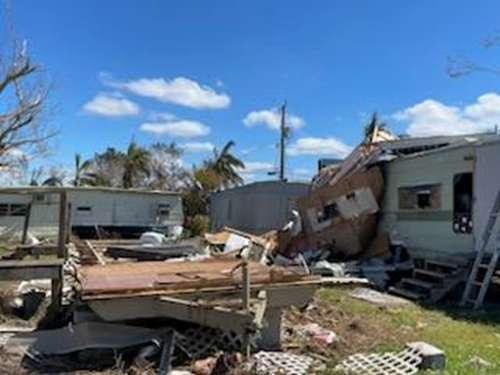Picking up the Pieces after Hurricane Ian
It’s all hands on deck in Florida right now. As the we at the Farmworker Association do our best to mobilize for storm recovery, can’t help but notice that we aren’t the only ones. Idle hands are surely the enemy when it comes to rebuilding the communities in need right now, and luckily it seems that everyone is on the same page with that. We’ve had a rush of donations coming into our office from community members, other organizations, and from our friends at Neighbors Helping Neighbors, all of which are being put in the hands of those who need it most. The donations- dry goods, canned foods, clothing, hygiene items, diapers- are in high demand, particularly in Southwest Florida. Morale is shaky at best for the communities affected. Wouldn’t you feel the same if you lost everything? Everyone volunteering in recovery, including FWAF staff, is working diligently to keep spirits up and needs met.
Five of our staff also
visited Arcadia to bring donations and connect with the affected farmworker
community. The flooding and storm debris are still very much a problem in
Arcadia, with entire neighborhoods still underwater. Roads are blocked off
because of fallen trees, roofs are torn off houses, and people out of work
encompassed our tragic scenery. We visited an orange grove to witness the
damages there, and we saw nothing but what we expected to see- tree debris,
waste, and the loss of opportunity. I felt nauseous. The trees that weren’t
fallen over had lost most of their fruits, and those with fruit left are still
at risk. With the damage to the trees and to the stems of the oranges, they
will never ripen. It will be at least two seasons before Florida’s citrus
industry will fully recover from the hurricane damage, and farmworkers will
feel the brunt of that difficult recovery. Farmworkers all throughout Florida
will certainly be affected by the crop damage from the storm; there is little
work available with no crops to harvest. Most citrus workers in Florida are H2A
workers from other countries, who depend on their incomes working in the U.S.
to feed their families back home.
FWAF staff member (right) with a volunteer in
Arcadia sorting donations
As clean-up continues, and once the aftermath of hurricane Ian
is no longer a national news item, we must remember that the farmworker
communities of Florida are still struggling to sustain themselves and their families
without work, many without homes, and those who are undocumented, unable to
qualify for government assistance programs.
At the same time, food prices continue to rise due to scarcity.
Damage to Arcadia homes
Communities of color are all too often, and all too
purposefully, forgotten. We must continue to push for the aid they deserve, and
the replenishing of their communities. We must not forget what is happening-
how they are being forced to wait on the islands that are their homes, and
forced to go without food, water, work. We must continue to fight for what our
is the promise of this country – the right to life, liberty, and pursuit of
happiness. It is at perilous times like
these that we must call out the underlying systemic problems and that have
allowed this neglect from the government, and we must demand equity, protection
and prioritization of the most vulnerable.
The system is not broken.
This is exactly the way it was meant to work. Ostracized communities stay
ostracized, so that the rich can become richer. People of color are othered,
being barred from basic human liberties, and their traumas swept under the rug
time and time again. We must break the cycle and rise to action even after
these tragedies are swept. Equity will cut the path to justice, and we must
waste no more time getting started.
by Finn Spencer


 Flood in Kissimmee mobile home community
Flood in Kissimmee mobile home community 




Comments
Post a Comment